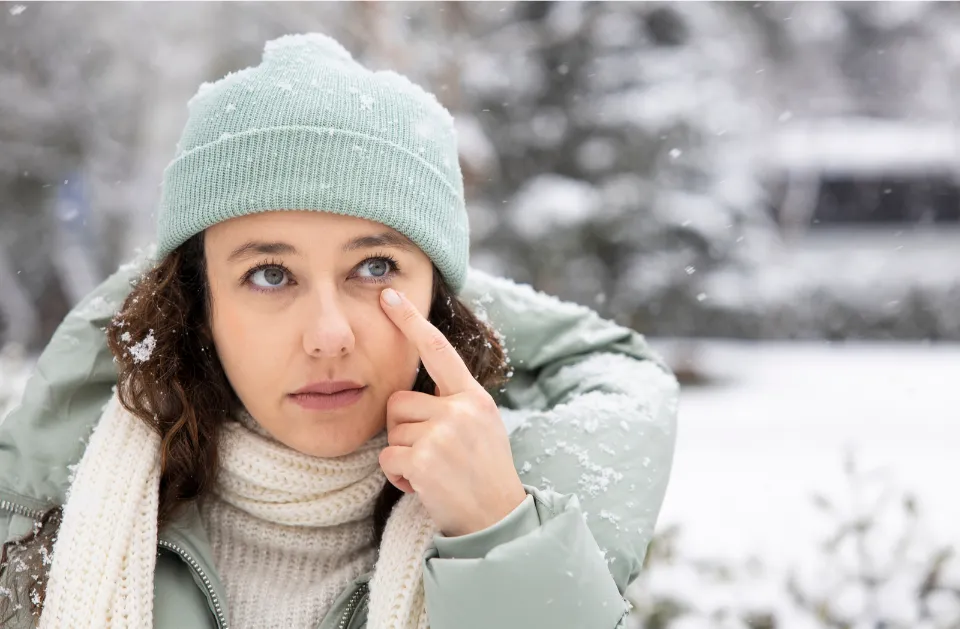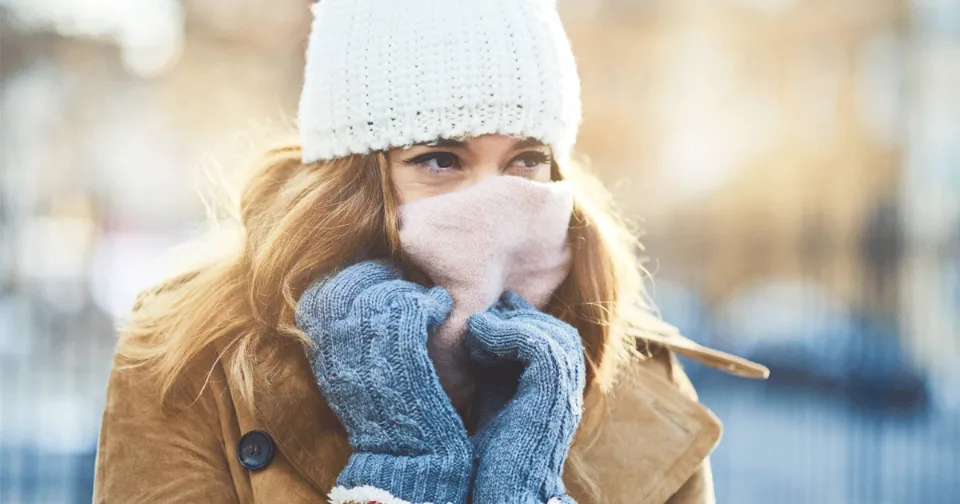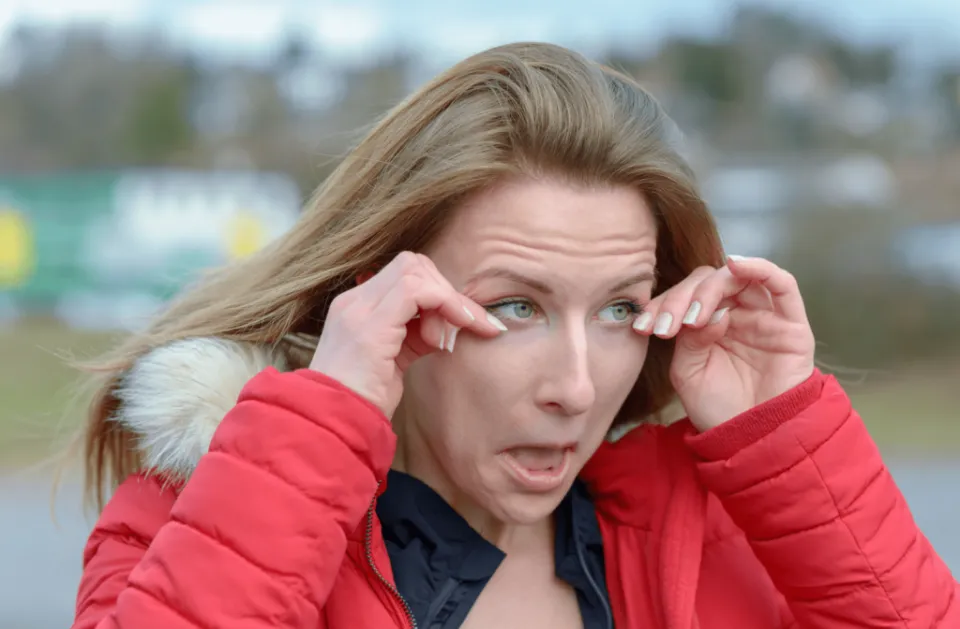As we step outside into the chillier winter weather, watering eyes are a common occurrence. Our eyes have a thinner layer of tears to cushion the delicate surface cells when cold air increases evaporation.
The lacrimal gland, which secretes an aqueous layer of tear film from the eye, may produce more tears as a result of this condition. As a result, we may experience eye flooding and cheek leaking of tears.
Continue reading to find out the cause of your watery eyes on cold days and how to treat it.
Eyes Watering in the Cold: Causes
Watery eyes are commonly caused by windy days and cold, dry air that dehydrates your eyes. Your tear glands will work extra hard to produce extra tears as your eyes become excessively dry. When your tear ducts are overworked, tears may start to fall instead of just lubricating your eyes. Your tear ducts may give the impression that you are sad even though you are not. They cannot be turned off immediately, like a furnace.
It’s not just the cold weather outside that makes your eyes water. Cold weather tempts you to crank up the heat in your car or house, which creates the dry air necessary to irritate your eyes. Your tear glands may overproduce lubricant in response to this irritation, which can cause sudden eye watering.

Watery eyes can occasionally be a sign of healthy eyes, despite how annoying it can be. Your tear glands are producing the extra lubrication your eyes require as moisture evaporates in the chilly air, which is a sign that they are functioning properly and producing the tears you need.
In other circumstances, dry eye disease may be the source of watery eyes. Watery eyes combined with other symptoms like redness, eye fatigue, scratchiness, or pain are indicative of dry eye disease. A tear film problem can be indicated by excessive tears, necessitating artificial tears or prescription eye drops to relieve the symptoms.
Eyes Watering in the Cold: Treatments
The good news is that you can keep your eyes comfortable and safe this winter. You might require specific drops, a lifestyle change, or additional therapies. What’s best can be advised by your eye doctor. Here are some pointers to help you get going.
Lifestyle Changes Tips
- Blink more. This aids in rehydrating your eyes. If you spend all day staring at screens, your blinking may decrease. Every hour or so, take a 5-minute break from your computer. or take a 20-foot-distance look for 20 seconds every 20 minutes. The 20/20/20 rule refers to this.
- Change your contacts. Try the daily disposable soft contact lenses. If that doesn’t work, find out if you should get dry eye contact lenses from your eye doctor. Or you could use glasses instead.
- Outside, cover your eyes. If regular sunglasses aren’t providing you with enough wind protection, try wraparound sunglasses.
- Avoid letting heat touch your face. Adjust heaters or vents in your car so the air doesn’t blow directly into your eyes.
- Verify the medications you are taking. Certain medications or the components in them make dry eyes worse. Examples include birth control pills, blood pressure medications, antidepressants, antihistamines, and decongestants. All of your medications, including vitamins and supplements, should be disclosed to your doctor.
- Include more omega-3 fatty acids. fatty fish like salmon and tuna contain these beneficial oils. There is some evidence to suggest that these fats may reduce eye or eyelid inflammation. They could assist your glands in producing oily tears. Additionally, omega-3 supplements are an option. Find out if they are appropriate for you by asking your doctor.
- Drink more water. Anybody can benefit from this advice. However, when you’re hydrated, your eyes might produce moisture on their own a little more easily.
- Travel safely. Your doctor should be informed of your winter travel plans, especially if you intend to fly or go on a mountain getaway. Aboard aircraft and at high altitudes, the air is drier. You might need to take additional precautions to safeguard your eyes.
Try Home Remedies
- Use a humidifier. The indoor air will become more humid as a result. When you go to bed, keep one nearby. If you use a CPAP machine, a humidifier may be very beneficial. Though they can blow air in your eyes, CPAP machines can make breathing easier. Purchase a compact, transportable humidifier. However, a central humidifier can increase the humidity levels in your entire house.
- Make use of warm compresses. For five to ten minutes, place a blanket over your eyes and keep the heat low. This could improve the blood flow to your meibomian glands. Your eyelids have a row of these minuscule glands along their edges. They produce the oily component of your tears, which is an essential component of the moisture layer covering your eye.
- Clean and massage your eyelids. This is yet another method for enhancing the flow of the oil produced by your glands.
Apply Artificial Tears
Your eye doctor will likely start by recommending over-the-counter (OTC) eyedrops. If symptoms are mild, these “artificial tears” might be the only treatment you need. However, there are various types. Find out which is best for you by asking your eye doctor.
Preservatives are often included in eyedrops. Although they might irritate your eyes, they help prevent the growth of microorganisms inside the bottle. If you use drops four or more times per day or more, think about switching to preservative-free drops. These are packaged in one-use vials.
In the form of a gel or an ointment, you can also try artificial tears. In general, it’s best to use them before bed because they might slightly blur your vision.

Talk to Your Doctor
Prescription Treatments for Dry Eye
You may need other treatments, including:
- Prescription eyedrops
- Silicone or dissolvable tear duct plugs
- Surgery
Over time, dry eyes can impair your vision. If lifestyle modifications and OTC remedies are insufficient, keep your eye doctor informed. Sjogren’s syndrome is one condition they might want to rule out.
If you need assistance managing any additional medical conditions, let your medical team know. Some conditions, such as uncontrolled diabetes and rheumatoid arthritis, can make dry eyes worse. No matter what’s causing your symptoms, your doctor can work
Tips to Take Care of Your Eyes in the Cold
Your eyes require special care in the cold. Some tips to keep your eyes extra safe in winter include:
- Protect your eyes from injuries and scratches caused by snow. Snowflakes can scratch the cornea with their sharp edges.
- Do not share your eyeliner or mascara with anyone, even during the holiday season. Perfect makeup is not worth the chance of contaminating others.
- Don’t be afraid to blink a lot. The best way to lubricate your eyes while they are trying to find the ideal moisture balance is to blink.
Summary
In summary, you should modify your habits, if necessary, use artificial tears, or immediately see a doctor if you experience frequent tears in cold weather.



